Afternoon on a Hill by Edna St. Vincent Millay
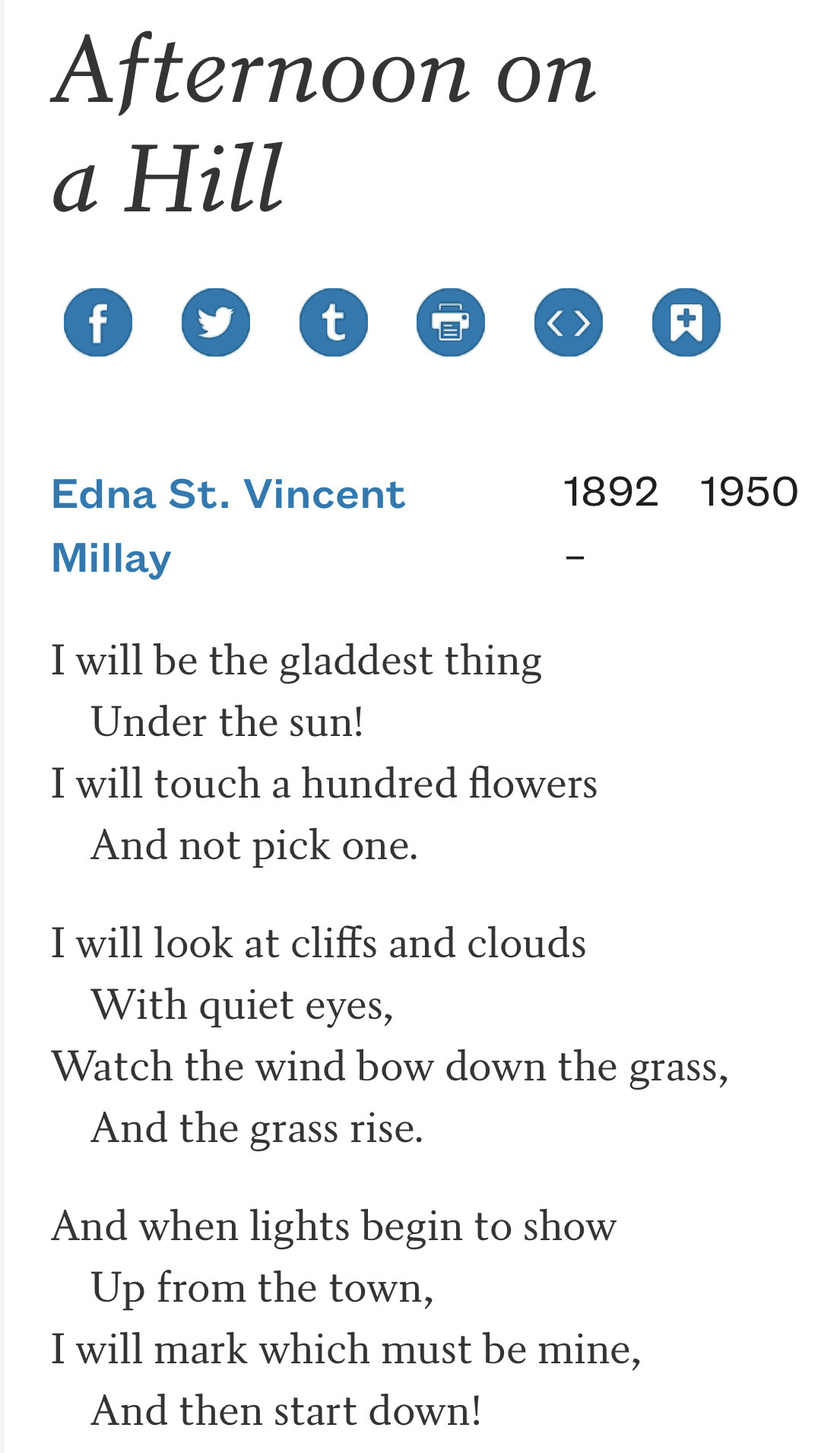
This page serves as a compilation of poems & poem-adjacent things. Alphabetical order by title. My favorites are starred (☆).

Again and again, even though we know love’s landscape
and the little churchyard with its lamenting names
and the terrible reticent gorge in which the others
end: again and again the two of us walk out together
under the ancient trees, lay ourselves down again and again
among the flowers, and look up into the sky.
My living brother
is treating us to dinner. He opens the menu wide like a set of wings
across the table. Anything you want
he says. His voice glimmering above
the shining heavens of the silverware. The other one,
my dead brother, is sitting
in the dark in the graveyard, his back leaning back against his name.
I’m walking by with my favorite drug
inside me. He’s picking at a scab on his wrist.
He looks up, opens his arms
wide above the grass. Anything you want, he says. His body beginning
to wash out, his voice slowly crawling back.
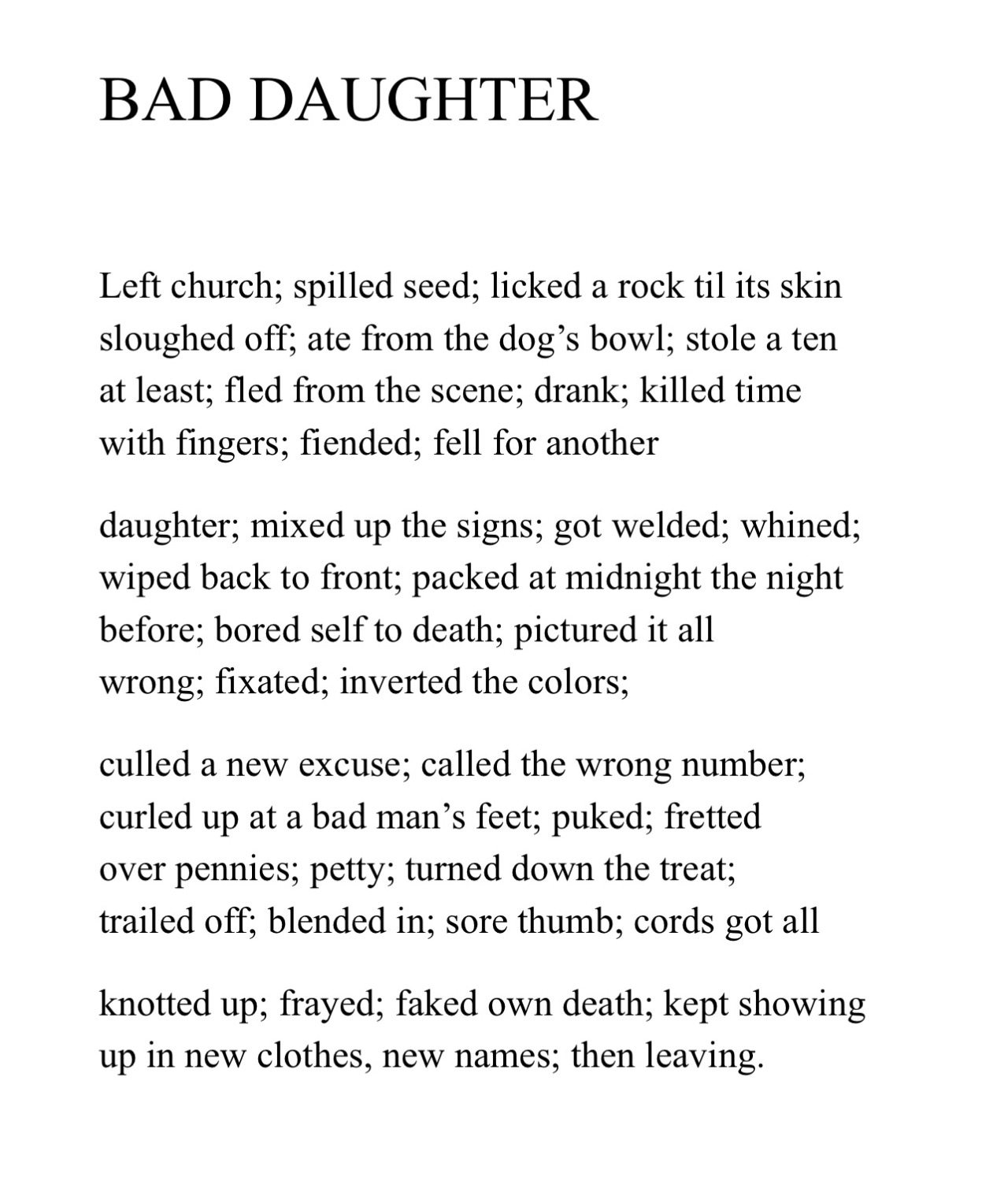

I don't know if this is an excerpt or the full poem.
For months my daughter carried
a dead monarch in a quart mason jar.
To and from school in her backpack,
to her only friend’s house. At the dinner table
it sat like a guest alongside the pot roast.
She took it to bed, propped by her pillow.Was it the year her brother was born?
Was this her own too-fragile baby
that had lived—so briefly—in its glassed world?
Or the year she refused to go to her father’s house?
Was this the holding-her-breath girl she became there?This plump child in her rolled-down socks
I sometimes wanted to haul back inside me
and carry safe again. What was her fierce
commitment? I never understood.
We just lived with the dead winged thing
as part of her, as part of us,
weightless in its heavy jar.
Someone spoke to me last night,
told me the truth. Just a few words,
but I recognized it.
I knew I should make myself get up,
write it down, but it was late,
and I was exhausted from working
all day in the garden, moving rocks.
Now, I remember only the flavor —
not like food, sweet or sharp.
More like a fine powder, like dust.
And I wasn’t elated or frightened,
but simply rapt, aware.
That’s how it is sometimes —
God comes to your window,
all bright light and black wings,
and you’re just too tired to open it.
we all order his favorite drink.
we forget the hole he punched in the door.
the hole he shot through the dog.
he was so good at making holes, except when it came time
to dig one for his body.there could be bones mixed in with our flour,
and we would never even know.
we could be eating cookies, and he could be
dead inside our mouths.it feels stupid to be sad when he was mean for so long.
he only got nice when he was dying, and
i don't know if that counts as becoming a better person.sometimes, i imagine him watching over me,
and i hide.
My candle burns at both ends;
It will not last the night;
But ah, my foes, and oh, my friends—
It gives a lovely light!
What's it like to be a human
the bird askedI myself don't know
it's being held prisoner by your skin
while reaching infinity
being a captive of your scrap of time
while touching eternity being hopelessly uncertain
and helplessly hopeful
being a needle of frost
and a handful of heat
breathing in the air
and choking wordlessly
it's being on fire
with a nest made of ashes
eating bread
while filling up on hunger
it's dying without love
it's loving through deathThat's funny said the bird
and flew effortlessly up into the air
No blame. Anyone who wrote Howl and Kaddish
earned the right to make any possible mistake
for the rest of his life.
I just wish I hadn't made this mistake with him.
It was during the Vietnam war
and he was giving a great protest reading
in Washington Square Park
and nobody wanted to leave.
So Ginsberg got the idea, "I'm going to shout
"the war is over" as loud as I can," he said
"and all of you run over the city
in different directions
yelling the war is over, shout it in offices,
shops, everywhere and when enough people
believe the war is over
why, not even the politicians
will be able to keep it going."
I thought it was a great idea at the time
a truly poetic idea.
So when Ginsberg yelled I ran down the street
and leaned in the doorway
of the sort of respectable down on its luck cafeteria
where librarians and minor clerks have lunch
and I yelled "the war is over."
And a little old lady looked up
from her cottage cheese and fruit salad.
She was so ordinary she would have been invisible
except for the terrible light
filling her face as she whispered
"My son. My son is coming home."
I got myself out of there and was sick in some bushes.
That was the first time I believed there was a war.
Life is short, though I keep this from my children.
Life is short, and I’ve shortened mine
in a thousand delicious, ill-advised ways,
a thousand deliciously ill-advised ways
I’ll keep from my children. The world is at least
fifty percent terrible, and that’s a conservative
estimate, though I keep this from my children.
For every bird there is a stone thrown at a bird.
For every loved child, a child broken, bagged,
sunk in a lake. Life is short and the world
is at least half terrible, and for every kind
stranger, there is one who would break you,
though I keep this from my children. I am trying
to sell them the world. Any decent realtor,
walking you through a real shithole, chirps on
about good bones: This place could be beautiful,
right? You could make this place beautiful.
You tell me to live each day
as if it were my last. This is in the kitchen
where before coffee I complain
of the day ahead—that obstacle race
of minutes and hours,
grocery stores and doctors.But why the last? I ask. Why not
live each day as if it were the first—
all raw astonishment, Eve rubbing
her eyes awake that first morning,
the sun coming up
like an ingénue in the east?You grind the coffee
with the small roar of a mind
trying to clear itself. I set
the table, glance out the window
where dew has baptized every
living surface.
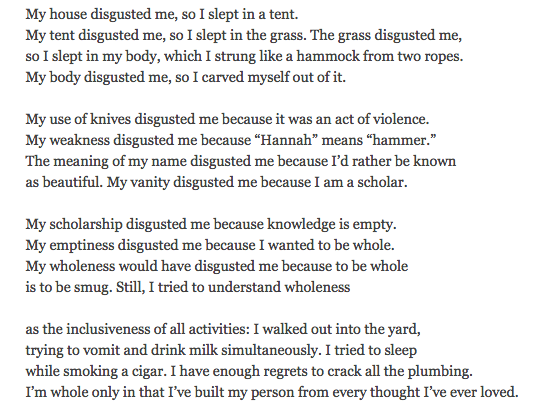

I’m not feeling strong yet, but I am taking
good care of myself. The weather is perfect.
I read and walk all day and then walk to the sea.
I expect to swim soon. For now I am content.
I am not sure what I hope for. I feel I am
doing my best. It reminds me of when I was
sixteen dreaming of Lorca, the gentle trees outside
and the creek. Perhaps poetry replaces something
in me that others receive more naturally.
Perhaps my happiness proves a weakness in my life.
Even my failures in poetry please me.
Time is very different here. It is very good
to be away from public ambition.
I sweep and wash, cook and shop.
Sometimes I go into town in the evening
and have pastry with custard. Sometimes I sit
at a table by the harbor and drink half a beer.
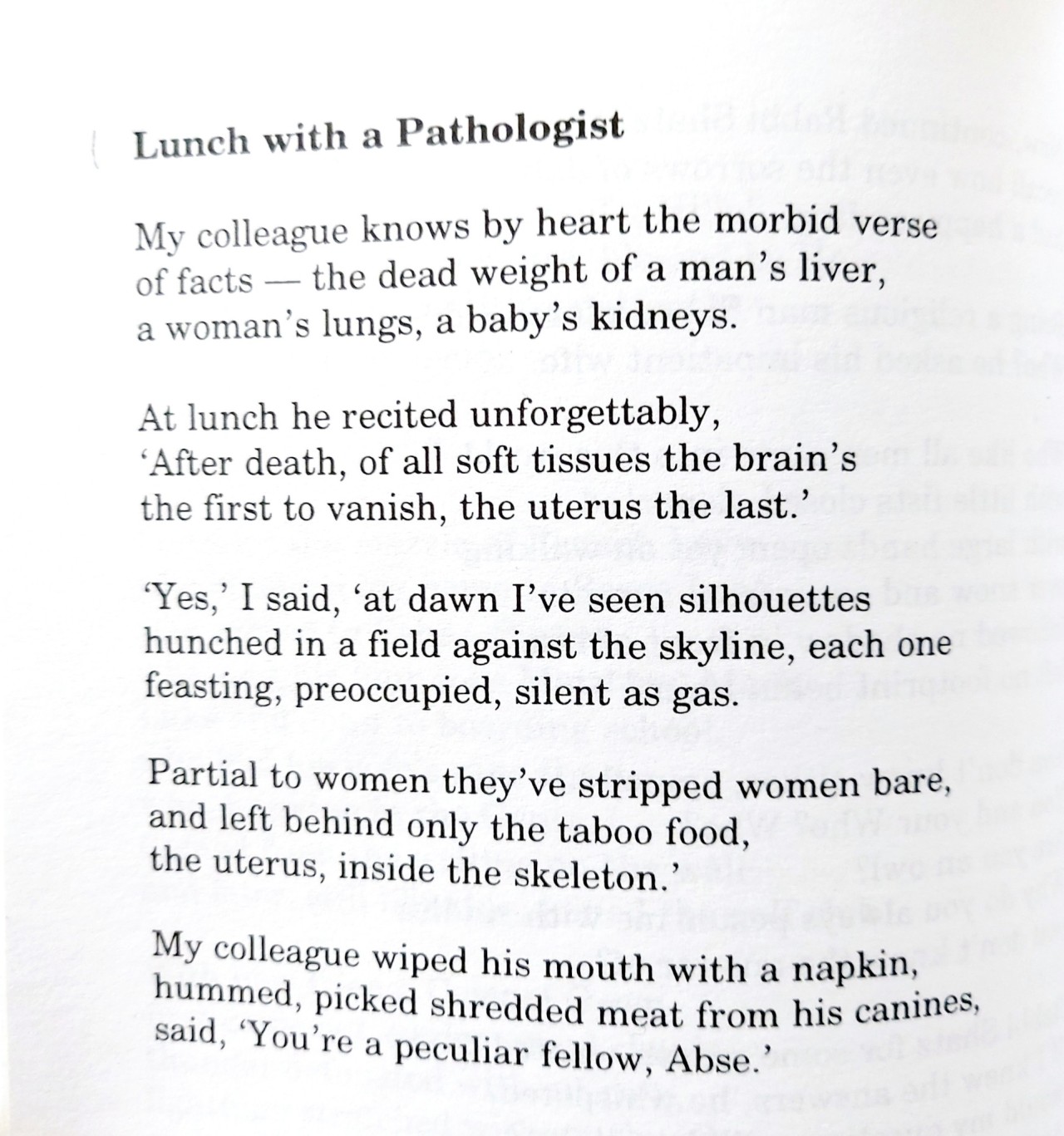
My notebook has remained blank for months
thanks to the light you shower
around me. I have no use
for my pen, which lies
languorously without grief.Nothing is better than to live
a storyless life that needs
no writing for meaning—
when I am gone, let others say
they lost a happy man,
though no one can tell how happy I was.
If I could come back,
I wouldn’t come under any other banner.
I’d still embrace you
with two severed hands.
I don’t want wings in paradise,
I just want your graves by the river.
I want eternity at the breakfast table
with the bread and oil.
I want you—
earth,
my defeated banner.
Do not care if you bring only your light body.
Would just be so happy to sit at the table
and talk about the menu. Miss you.
Wish we could bet which chilis they’ll put
on the cubes of tofu. Our favorite.
Sometimes green. Sometimes red. Roasted
we always thought. But so cold and fresh.
How did they do it? Wish you could be here
to talk about it like it was so important.
Wish you could. Watched you on the screens
as I was walking, as I was cooking. Wished you
could get out of the hospital. Can’t
bring myself to order our dish and eat it
in the car. Miss you laughing. Miss
you coming in from the cold or one
too many meetings. Laughing. I’ll order
already. I’ll order seven helpings, some
dumplings, those cold yam noodles that you
like. You can come in your light
body or skeleton or be invisible I don’t even
care. Know you have a long way to travel.
Know I don’t even know if it’s long
at all. Wish you could tell me. What
you’re reading. If you’re reading.
Miss you. I’m at the table in the back.
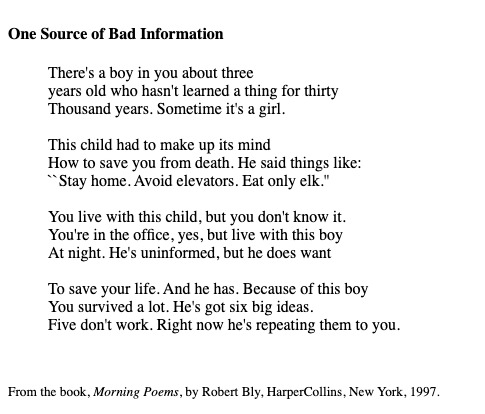

It is a kind of love, is it not?
How the cup holds the tea,
How the chair stands sturdy and foursquare,
How the floor receives the bottoms of shoes
Or toes. How soles of feet know
Where they’re supposed to be.
I’ve been thinking about the patience
Of ordinary things, how clothes
Wait respectfully in closets
And soap dries quietly in the dish,
And towels drink the wet
From the skin of the back.
And the lovely repetition of stairs.
And what is more generous than a window?
I am the yellow finch that came to her feeder an hour before she died. I was the last living thing she saw, so my responsibility was great. Yet all I did was eat. Through eight long months of winter the black oiled sunflower seeds had gone untouched—not a single one of my kind or any other kind had approached them. It was too much work. Even if we’d had the strength—which we did not, half-starved as we were—we were not in the mood to crack anything. On the morning of the twenty-second of April she took them away and refilled the feeding tube with sunflower hearts—sheeny niblets whose hard outer husk had been stripped away by some faraway, intricate machine. She went back inside and waited. From my branch I could see her do the things she liked to do—she picked up a towel from off the floor, she filled out a card stopping the mail, she boiled water, she stared into space. She saw me coming. Her face flickered with, if not exactly joy, the ordinary wellspring of life. It’s true there was a sheet of glass between us. But I could see the seeds of her eyes and the upturned corners of her mouth. I ate a heart. I turned my head. She looked at me as if I were the last living thing on earth. And as I was, I kept on eating.
I do kind gestures. Remove my appendix.
I put my ear to a flat shell and—nothing.
I play the lottery ironically. Get married.
Have a smear test. I put my ear to the beak
of a dead bird—nothing. I grow wisdom
teeth. Jog. I pick up a toddler’s telephone,
Hello?—No answer. I change a light bulb
on my own. Organize a large party. Hire
a clown. Attend a four-day stonewalling
course. Have a baby. Stop eating Coco Pops.
I put my ear right up to the slack and gaping
bonnet of a daffodil—. Get divorced. Floss.
Describe a younger person’s music taste as
'just noise.' Enjoy perusing a garden center.
Sit in a pub without drinking. I stand at the
lip of a pouting valley—speak to me!
My echo plagiarizes. I land a real love plus
two real cats. I never meet the talking bird
again. Or the yawning hole. The panther
of purple wisps who prowls inside the air.
I change nappies. Donate my eggs. Learn
a profound lesson about sacrifice. Brunch.
No singing floorboards. No vents leaking
scentless instructions. My mission is over.
The world has zipped up her second mouth.

This time of year, the window boxes smell of the hills,
the thyme and rosemary that grew there,
crammed into the narrow spaces between the rocks
and, lower down, where there was real dirt,
competing with other things, blueberries and currants,
the small shrubby trees the bees love—
Whatever we ate smelled of the hills,
even when there was almost nothing.
Or maybe that’s what nothing tastes like, thyme and rosemary.Maybe, too, that’s what it looks like—
beautiful, like the hills, the rocks above the tree line
webbed with sweet smelling herbs,
the small plants glittering with dew—It was a big event to climb up there and wait for dawn,
seeing what the sun sees as it slides out from behind the rocks,
and what you couldn’t see, you imagined;your eyes would go as far as they could, to the river, say,
and your mind would do the rest—And if you missed a day, there was always the next,
and if you missed a year, it didn’t matter,
the hills weren’t going anywhere,
the thyme and rosemary kept coming back,
the sun kept rising, the bushes kept bearing fruit—The streetlight’s off: that’s dawn here.
It’s on: that’s twilight.
Either way, no one looks up. Everyone just pushes ahead,
and the smell of the past is everywhere,
the thyme and rosemary rubbing against your clothes,
the smell of too many illusions—Between them, the hills and sky took up all the room.
Whatever was left, that was ours for a while.
But eventually the hills will take it back, give it to the animals.
And maybe the moon will send the seas there,
and where we lived will be a stream or river coiling around the base of the hills,
paying the sky the compliment of reflection.I went back but I didn’t stay.
Everyone I cared about was gone,
some dead, some disappeared into one of those places that don’t exist,
the ones we dreamed about because we saw them from the top of the hills—
I had to see if the fields were still shining,
the sun telling the same lies about how beautiful the world is
when all you need to know of a place is, do people live there.
If they do, you know everything.The hills are terrible, they hide the truth of the past.
Green in summer, white when the snow falls.
That morning I heard water being poured into a teapot.
The sound was an ordinary, daily, cluffy sound.
But all at once, I knew you loved me.
An unheard-of thing, love audible in water falling.
Measure the walls. Count the ribs. Notch the long days.
Look up for blue sky through the spout. Make small fires
with the broken hulls of fishing boats. Practice smoke signals.
Call old friends, and listen for echoes of distant voices.
Organize your calendar. Dream of the beach. Look each way
for the dim glow of light. Work on your reports. Review
each of your life’s ten million choices. Endure moments
of self-loathing. Find the evidence of those before you.
Destroy it. Try to be very quiet, and listen for the sound
of gears and moving water. Listen for the sound of your heart.
Be thankful that you are here, swallowed with all hope,
where you can rest and wait. Be nostalgic. Think of all
the things you did and could have done. Remember
treading water in the center of the still night sea, your toes
pointing again and again down, down to the black depths.

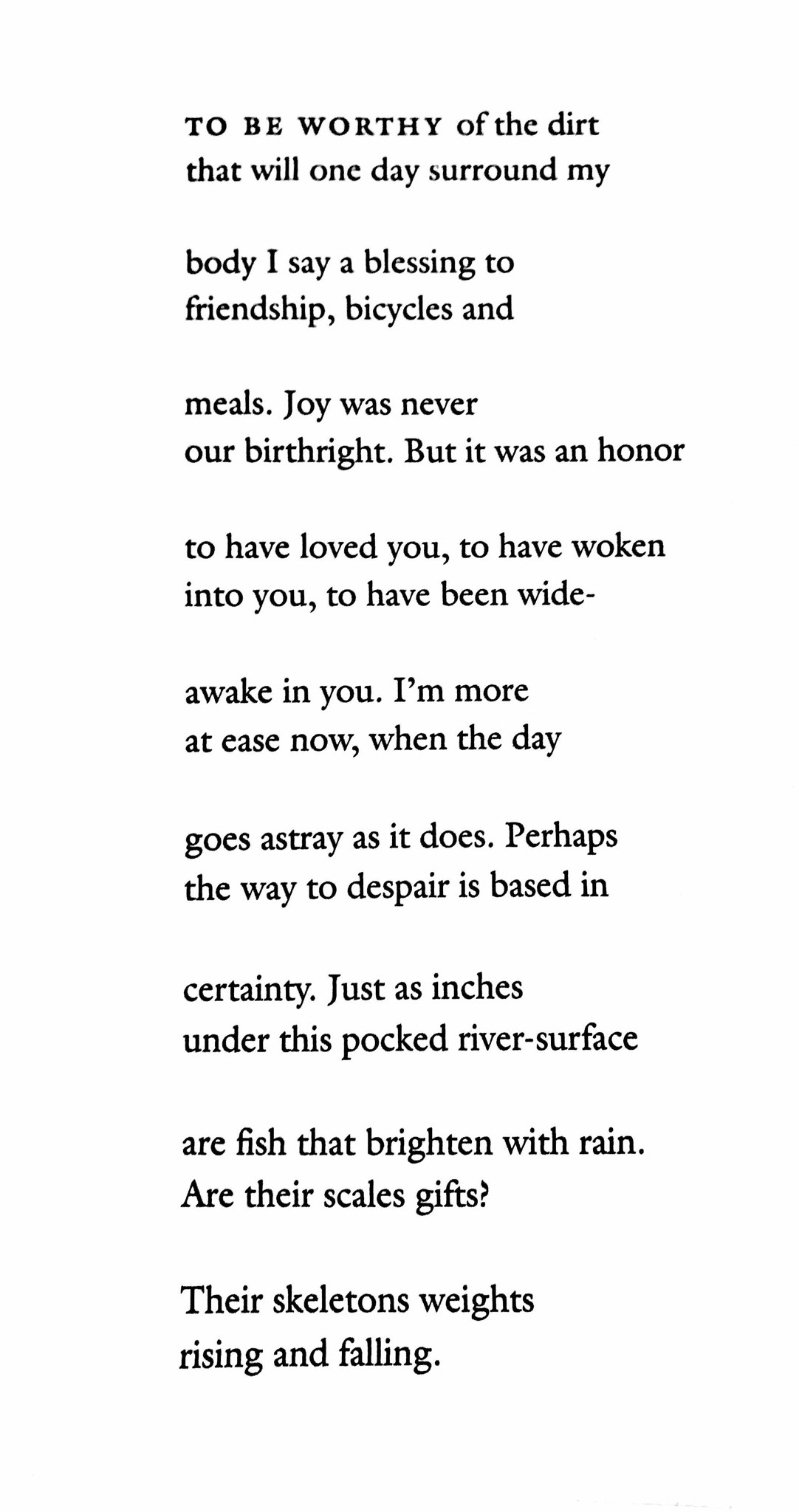

One morning, Don Miguel got out of bed
with one idea rooted in his head:
to graft his orange to his lemon tree.
It took him the whole day to work them free,
lay open their sides and lash them tight.
For twelve months, from the shame or from the fright
they put forth nothing; but one day there appeared
two lights in the dark leaves. Over the years
the limbs would get themselves so tangled up
each bough looked like it gave a double crop,
and not one kid in the village didn't know
the magic tree in Don Miguel's patio.The man who bought the house had had no dream
so who can say what dark malicious whim
led him to take his axe and split the bole
along its fused seam, then dig two holes.
And no, they did not die from solitude;
nor did their branches bear a sterile fruit;
nor did their unhealed flanks weep every spring
for those four yards that lost them everything,
as each strained on its shackled root to face
the other's empty, intricate embrace.
They were trees, and trees don't weep or ache or shout.
And trees are all this poem is about.
Your father wakes up in the morning & his throat catches on fire. Your father says: "I am angry before I am alive." Your father wakes up in the morning and he is bleeding from his mouth. Your father guzzles down the blood like whiskey. He has always tended to the bottle. Your father wakes up in the morning and there are maggots all over his body. Your father does not wake up the next morning. He always felt more like a familiar body than a father. Your father is gone. The maggots aren't, though.